So, it’s very late, and you’re about to go to bed and get some decent shut-eye for a change. This new puppy parent thing isn’t easy at all!
However, a loud freight-train-like sound wakes you up from your deepest sleep in the middle of the night. You turn to your partner in anger, but you quickly realize the dog is to blame!
But how could such a small, fluffy creature make such loud noises? Do Corgis snore? Do all dogs snore?
While it’s funny – and very annoying – that your newborn Corgi pup is snoring like a grown-up human being, at the same time, you’re starting to worry that something is wrong with its health.
After all, you have never heard a dog snore before.
Well, don’t panic just yet! We’re here to answer all of your questions and explain the doggy snoring phenomenon. So, sit back and read the entire article. It will take just a few minutes of your time, but you’ll definitely learn some valuable information!
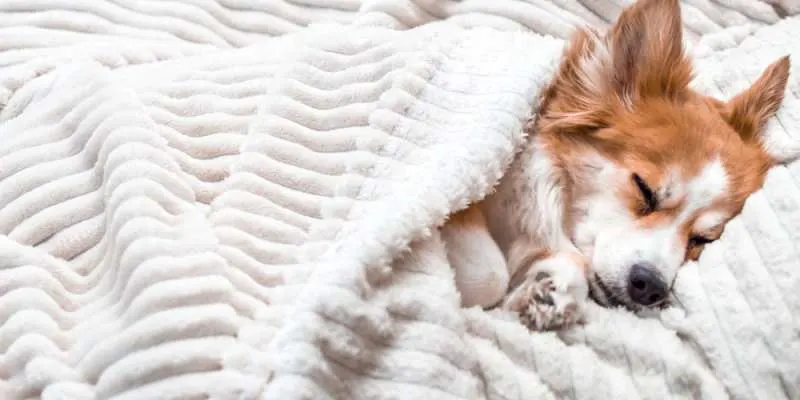
Do Corgis Snore?
The short answer to this question is – yes, some Corgis do snore. What’s more, not only Corgis but all dogs can snore. It all depends on the dog.
Interesting Fact: Queen Elizabeth has owned over 30 Corgis throughout her 68-year reign, and she didn’t let any of them sleep in her bedroom because almost all of them were snoring!
Why Do Dogs Snore?
To understand why your furry family member is snoring, we have to explain what snoring is in the first place.
Like in any other mammal, snoring in dogs is caused by restricted airflow. Snoring happens when the restricted air tries to pass through nasal passageways or the throat.
The annoying and loud sound is nothing more than vibrations hitting the upper airway during inhalation.
Snoring in humans is typically caused by obstructive sleep apnea, but that is rare in dogs. Nevertheless, snoring isn’t an illness but a symptom. And while it’s usually harmless, sometimes snoring can be a sign of an underlying health issue.
Can Dogs Have Sleep Apnea?
Yes, among other sleep issues, dogs can also have sleep apnea, just like us humans. Sleep apnea in dogs is a condition where breathing repeatedly stops and starts for brief moments. The symptoms are loud snoring that jolts a dog awake for a couple of seconds.
These sleep interruptions can leave a dog feeling sluggish and tired. Treatment options for this condition include surgery, using a steam humidifier, and weight loss for obese dogs.
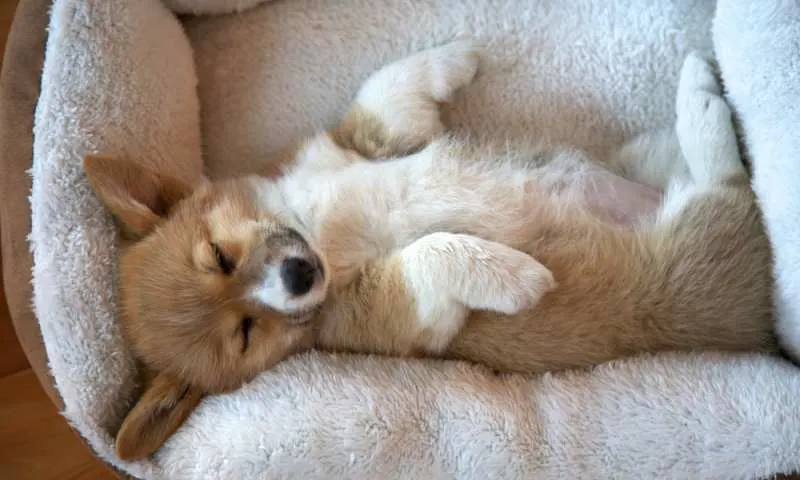
Some Breeds Are Predisposed To Snoring
Even though all dogs can snore, some breeds are more prone than others.
The brachycephalic breed is a category that includes all “flat-faced” dogs with which you can expect regular snoring. These are pugs, bulldogs, Shih Tzus, Chihuahuas, Chow Chows, Pekingese, Bull Mastiffs, Lhasa Apsos, and similar.
The nasal cavity in these breeds is smaller and shorter, and air has less room to travel through their airways. That often leads to airway obstructions and, thus, snoring.
Moreover, some of these breeds often require surgery to remove redundant skin folds that cause blocked passages and snoring.
The point is:
If your brachycephalic dog isn’t showing any signs of discomfort or illness, he’s perfectly fine and normal. But in case you do notice something strange, record it with your phone and show it to your vet at your next appointment.
Because even if those wrinkles are very much adorable, they can lead to severe breathing issues down the pike.
On the other hand, if you have a non-brachycephalic dog, you can assume that the snoring negatively impacts his sleep quality.
Why?
Because snoring can cause your dog to wake himself up quite a bit and thus, keep him from resting as profoundly as he would otherwise. If your dog has started to snore just recently, it is definitely time to visit a vet.
Ask your vet about your dog’s snoring – perhaps it only happens when your dog is in a specific sleeping position. Your vet can also run some medical tests to rule out any possible health issues.
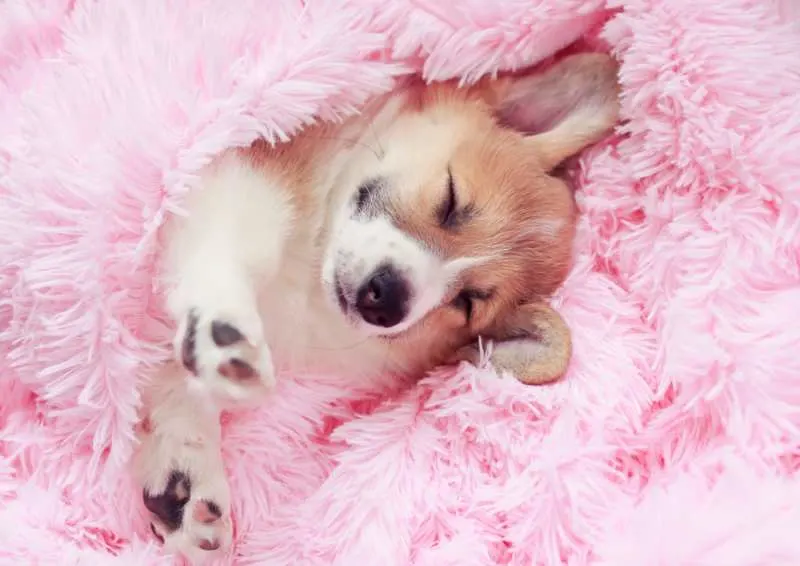
Reasons Your Corgi Is Snoring
Here are several common reasons why your pup might be snoring:
Sleeping Position
Dogs that sleep on their backs are more prone to snoring. Almost 5-10% of the dogs sleep on their backs, which is a position that is associated with snoring.
That usually happens because the base of the dog’s tongue falls back in its throat and blocks the air passageways.
Obesity
Just like in humans, extra weight in dogs can also cause snoring. If your dog is obese and has excess tissue around its nose and throat, there’s a huge possibility it will snore.
That’s because the extra tissue narrows and blocks its airway, which leads to restricted airflow and snoring.
Allergies
Dogs that are allergic are also more prone to snoring because of the congestion and airway restriction. If your dog’s nose is clogged, it’s more likely to snore.
Nasal congestion could be a result of nasal infections, and in some cases, even tumors. Also, some of the allergens that can cause congestion are perfumes, dust, specific foods, pollen, house dust mites, mildew, mold, smoke, etc.
Secondhand Smoke
Secondhand smoke can easily cause respiratory issues and snoring in all dogs because it can irritate the lungs and airways. Not only that – but secondhand smoke can also damage your dog’s respiratory system and lead to bronchitis, asthma, or even lung cancer.
Medications
Some medications such as painkillers and muscle relaxants make your pup relax too much, so the muscles in the throat loosen up – and cause snoring.
Weather
Dry air, changes in altitude, and varying air pressure can all cause nasal tissues to stick together, which can again cause air restriction and snoring – even if your Corgi is a silent sleeper.
Soft Palate Disorders
This condition is very common in brachycephalic dogs. Soft palate disorders are typically congenital defects of the soft tissue that separates the nasal from oral cavities at the back of the throat.
The most common disorders are the so-called cleft or defect in the palate and elongation of the palate. The overlapping restricts the airflow, which causes a dog to produce noises while breathing. This issue can easily be treated surgically.
Rhinitis
Don’t forget that dogs can get sick, too. A simple cold can lead to a stuffy nose. Dog’s mucus membranes are very sensitive and can easily get irritated or inflamed from bacteria, fungus, trauma, or other causes.
The symptoms of rhinitis usually include sneezing, nasal discharge, snoring, and labored breathing. Therefore, pay attention to your dog if you notice any snoring, as it may just be sick.
Dental Problems
Surprisingly, any growth, mass, or even an abscessed tooth can be the cause of snoring. If not treated, an infection could spread to the rest of your dog’s body and cause serious health issues.
Even hyperthyroidism can be a cause of snoring.
Fungal Disease
A disease called aspergilloses can be a cause of snoring, too. It is caused by mold, hay, grass clippings, dust, or straw. The fungus can enter through the nose’s moist lining and cause nasal discharge, sneezing, swelling, and snoring.
Obstruction
If your Corgi has something stuck in his nose or throat – like a part of his favorite toy or some food – it can block breathing and cause snoring.
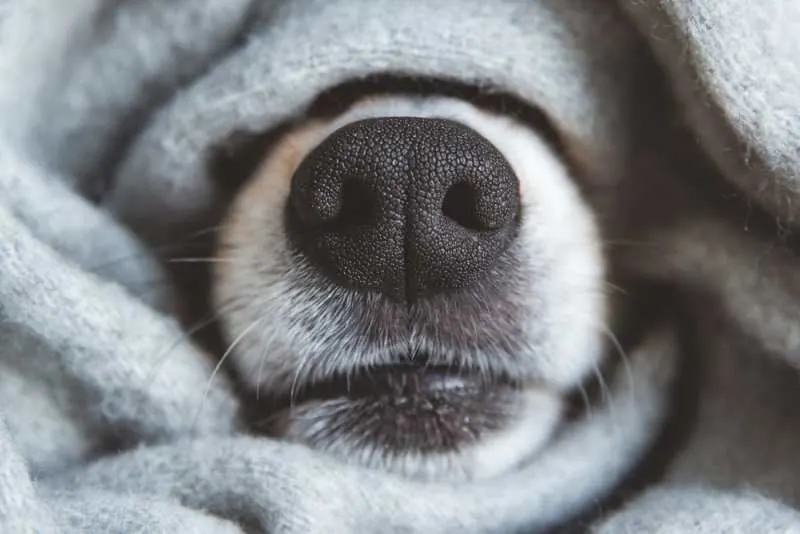
How To Stop Your Corgi From Snoring?
If you’re desperately trying to catch some sleep, but your Corgi’s loud snoring won’t let you, it’s time to do something about it.
Here are a few simple ways to prevent your dog from snoring:
1. Buy Him A Puppy Pillow
You can try to give your Corgi a puppy pillow to stop the snoring. As we already learned, snoring is often caused by a specific sleeping position – a neck resting against the ground or a snout out.
A pillow can make a significant change (in a good way) in your dog’s sleeping position and may just be the solution to your dog’s loud snoring!
2. Get An Air Humidifier
Your Corgi may suffer from dry mouth or throat due to a lack of natural lubricants. The throat flaps stick together if the air is dry, which increases the snoring.
A humidifier may do the trick, as it can bring back the moisture in the air.
3. Circular Dog Bed
A circular dog bed stimulates curling up, alleviating the pressure on the esophagus and opening the air passages.
4. Surgery
The last option to consider is, unfortunately, surgery. Sometimes excess tissue needs to be removed so your dog can breathe and sleep better.
If your dog has problems sleeping – or is constantly snoring – consult with your veterinarian.
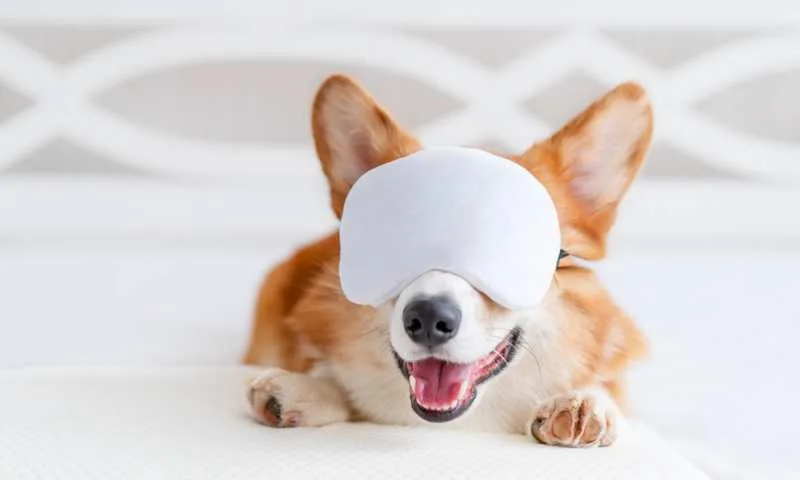
The Last Word
In the end, do Corgis snore? Well, the tendency to snore is very low but not impossible. If your Corgi is snoring, it’s usually a result of bad sleeping posture, but it can also be a sign of some health problem.
If your Corgi has started snoring just recently, or he is experiencing interrupted sleep, have the pup checked by your vet just to make sure everything is alright.
And in the meantime, there are some excellent ways to help your Corgi pup with snoring – such as a puppy pillow or an air humidifier.

